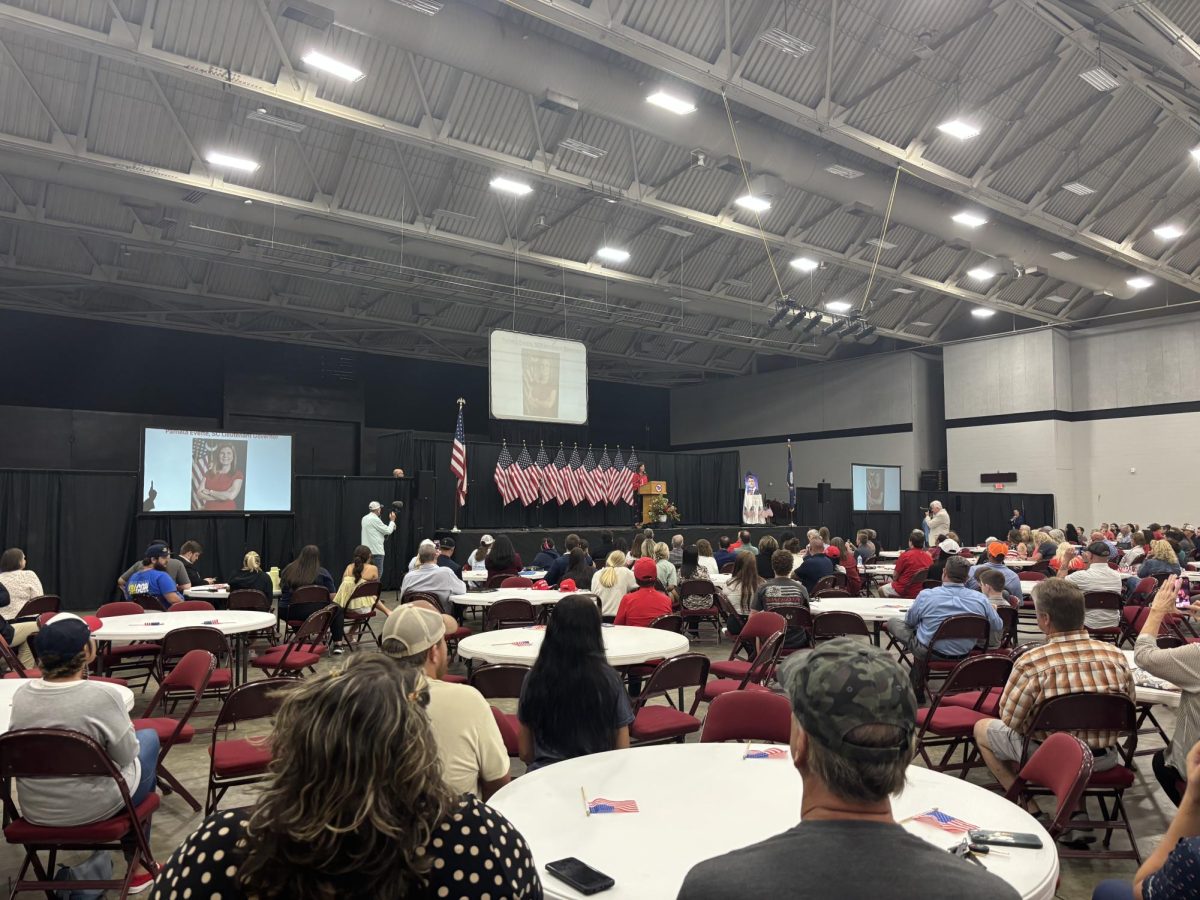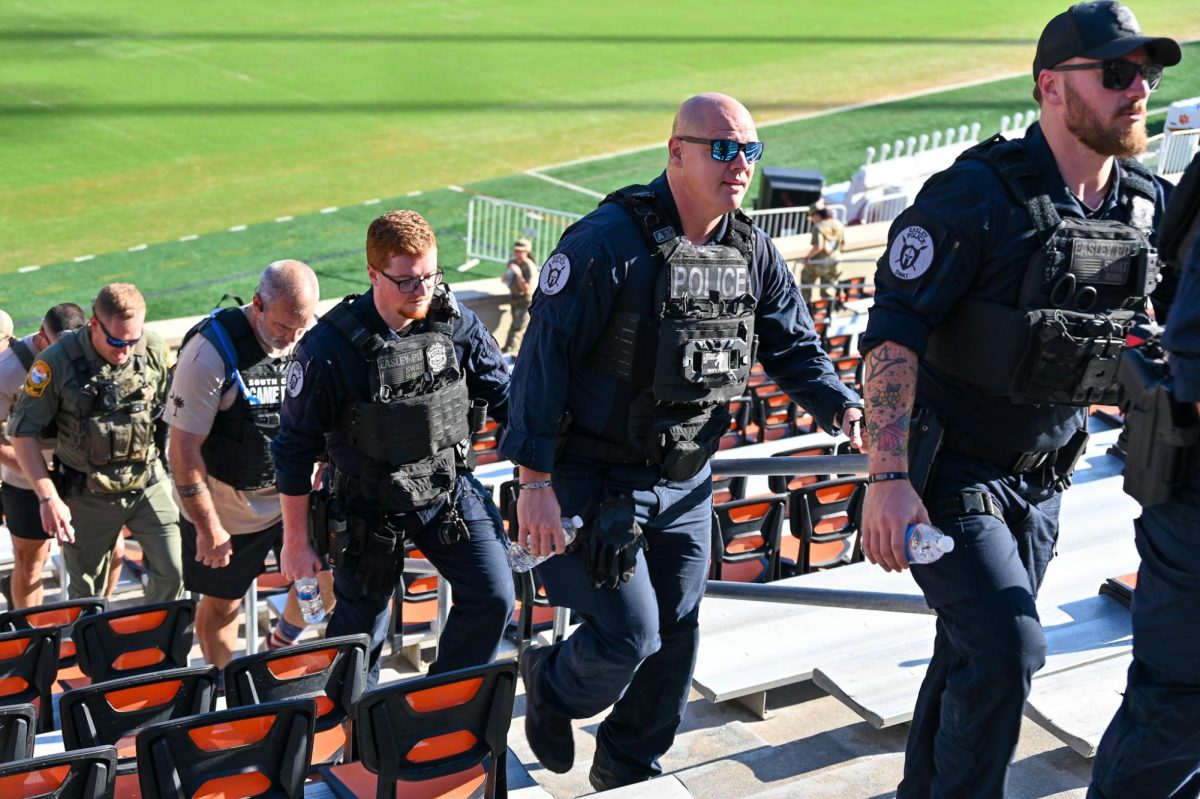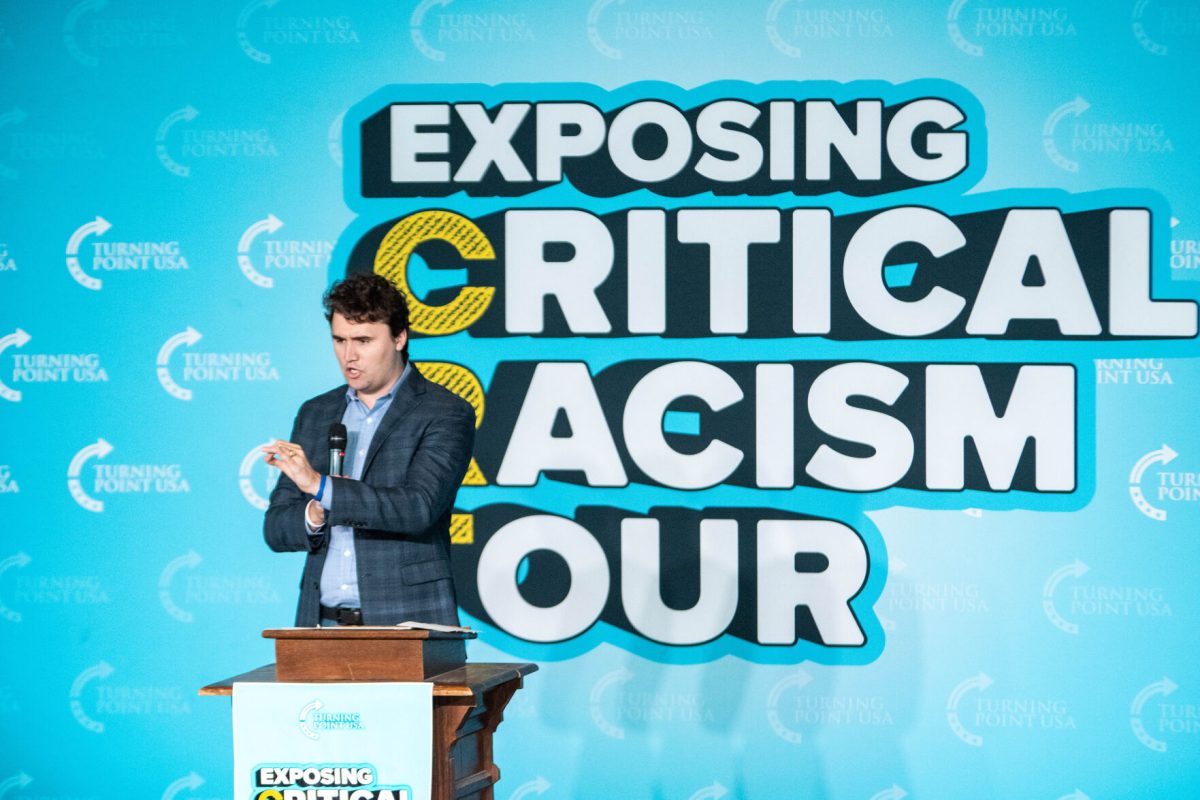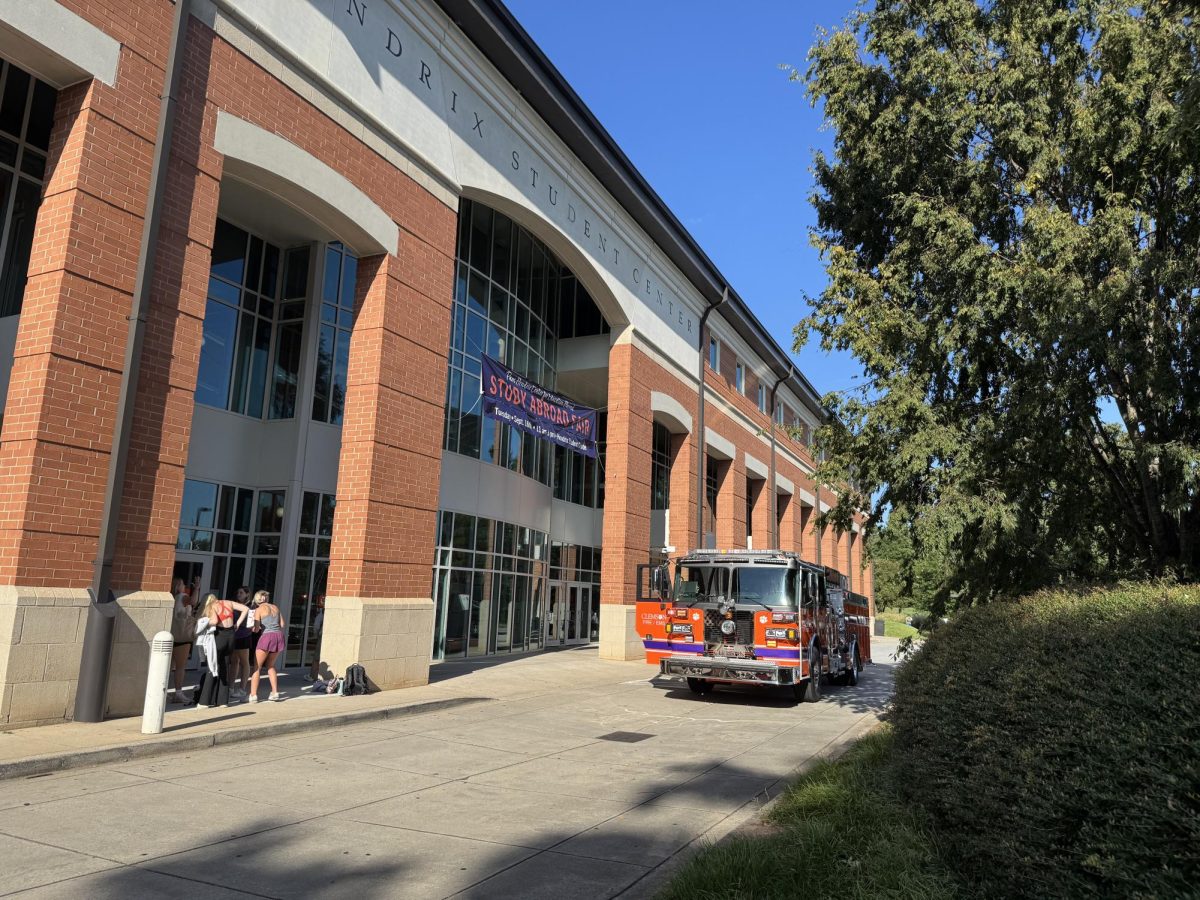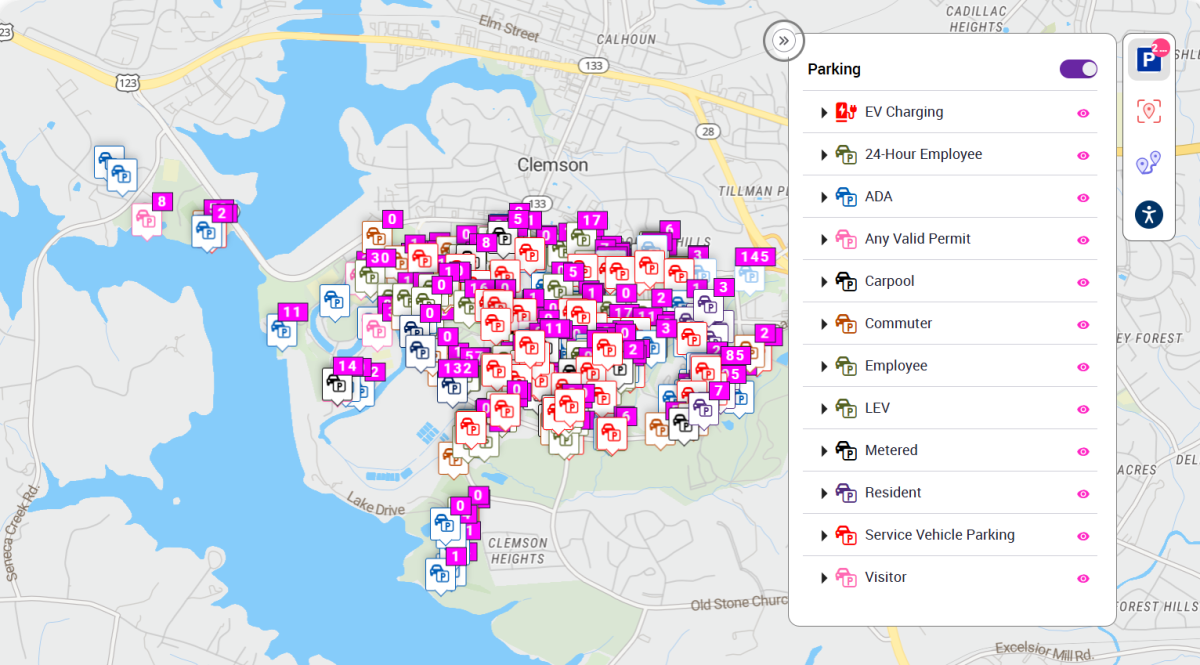Town Hall Meeting
Tuesday, Oct. 30, 7 p.m.
Tillman Auditorium
Doug Hallenbeck and other officers from the Clemson Student Affairs department took part in presenting and answering student questions and comments.
Here is an overview of some of the questions that were asked at Tuesday night’s meeting.
-
The PowerPoint presentation along with the newest version of the policy will be posted on Friday.
-
These transcripts are from the Questions portion of the meeting.
-
As one of the bigger club sports, we would not be hampered by most of the procedures, but we know it would impact smaller clubs. They Student Affairs said funding could no longer be used or requested for vehicles and that is an important part of our team. We are wondering what the deal with that is?
-
Doug Hallenbeck: Part of it is again, we will probably disagree on this, is that is it appropriate for us to spend significant dollars to buy a piece of equipment that we don’t control, maintain or have responsibility over? Are we spending a disproportionate amount of dollars on equipment like that when it could be used elsewhere? Those two things are going into the decisions of how the policy will move forward. That might be one of the things where we continue to evaluate the cost (in regards to their use of funds for boats and safety equipment) on a case-by-case basis. We will look at it and evaluate how those dollars are being allocated. We don’t want to be in a position that would harm anyone.
-
There is no on-campus college fair for our major (theatre), so we send 32 students to a fair to get jobs; it is discouraging to hear that that opportunity might be taken away from us when we want to go and get jobs.
-
Doug Hallenbeck: That is another area in terms of how funds are best allocated. You might be able to work with departments to best allocate those funds and what other mechanisms might be best for you and for your department.
-
We are concerned about the planning aspect of the document in terms of university power. Our four show season is chosen by our faculty allowing them the freedom to choose controversial shows and topics. We are worried this would make it so that the university can keep us from picking controversial topics they don’t want us to cover and what material can be censored.
-
Doug Hallenbeck: That is not our intent. It seems that you are already driven by your faculty. Our main idea is that we wouldn’t have to decide any of that. We would contract and would not be engaged in that process partly for that reason of censorship. It might get a little confusing with organizations considered to be with academic programs. If you are considered part of that, it creates a little change, but that is between the department and you.
-
How can faith-based organizations maintain contract status with the university when the personal beliefs of the organizations will be classified as discriminatory by the Title IX Act? We take nearly 600 students to a different states every year to volunteer. How will we be able to do that under the travel restrictions in the policy?
-
Myles Surrett: That non-discrimination act is the same one student organizations have been signing and has not changed in any shape or form. That is not a change in any way.
-
Hallenbeck: FCA currently pays for a large portion of that. That allows you to continue to work with folks to do the things that you want to do in an appropriate way. All of this can be on a case-by-case basis. We will look back on the travel aspect. Y’all have done a good job of letting us know that. We will go and look at that to make sure we are being fair.
-
You keep saying you will take a look at that (policy) and clearly it has a lot of changes to be made to it. We want to know what our involvement is in finalizing this policy. Will CUSG have any hand in it?
-
Doug Hallenbeck: That is all based on the funding pieces it seems. The students will have the opportunity to meet with the funding board and that is where a majority of questions seem to be coming from. If you are looking at the policy (refers to the presentation clarifying relationships among the organizations to the university) procedures and how to administer them that seems to be where concerns are and this is where we will continue changing in how to adjust those procedures. We are trying to spread funding to more student organizations. Some will have to deal with reduction in funding and others will deal with changes to funding because of limited funds. We will continue to involve students with club sports to learn about those concerns and other areas.
-
We have only just started to involve students in this because it was leaked, but will you share the current draft and what steps are you actually gonna take to involve students and hear them to actually change things?
-
Doug Hallenbeck: All of this will be posted online. We will continue to set up opportunities for direct feedback in the process. We will also be setting up more of the conversations moving forward in groups. Especially with groups that don’t know where they would lie. I want to be honest, the policy about the relationships we have with the university and the organization has not been changed, how we go about funding procedures is what will change.
-
What is the estimated amount of the budget allocated to student insurance policy? How will student equipment be capitalized?
-
Doug Hallenbeck: We don’t have an answer just yet about the insurance. $25000 will be the blanket. If something happened you could apply for the coverage as an org. This is an opportunity to protect you more than anything. Capitalized equipment, we are still working on that in terms of what is the university’s property and our responsibility for that and whether current inventory is student or state property. We are working with people on that. We would be checking up on them annually to see if it was in good enough condition. The university would not be responsible for any repairs but if it is unsafe they can tell them they are unable to keep using it. The repairs to these would be the organization’s responsibility. We have to have an inventory of all of it. The $25000 dollars will be out of the proposed allocation.
-
I found out I was no longer going to be on funding board when someone emailed me an application for the new funding board. I also learned new members would be paid for something I have done for free voluntarily. I have donated many hours because I see how passionate all students are and see how important it is to represent Clemson to the best of its ability and spread tiger paw and get Clemson sustainable. *Refers to the percentage of allocations stated in the policy* this is an average from the last five years, how can you allocate these numbers when you don’t know what they are asking for the current year. You are asking them to request money for 10-18 months in advance which is very hard to do. There will be a greater reliance on emergency funding. How is this policy going to help that? How is the new payment to the funding board members going help this at all?
-
Doug Hallenbeck: I don’t disagree. We are trying to place value on the time that you spend. If people don’t think we need to do that we are okay with it. We are trying to acknowledge people like you that have spent an extraordinary amount of time.
-
Myles Surrett: The student funding board now will be handling the funding for this upcoming year, so you are not being displaced from your job. They will start in November and will handle funding for fiscal year 2020. The total amount ($14000) is going to the entire funding board for 14 people. We will be releasing the current draft Friday. From a funding standpoint that it is hard for organizations to plan seven months in advance, is not based on hypothetical future projections. It is based on what they have done for campus in past and centered around that because it’s hard to project in the future. We want to validate the good work.
-
Would it not make sense to base it off of real numbers in the future not just what has happened in the past?
-
Doug Hallenbeck: We may be at an impasse at that point. It is hard for them to base these decisions if they have to go to funding board every time. Give them opportunity in advance to make an actual plan as opposed to ‘I hope this will work I will hope I get the money’ and that is a matter of interpretation of whether that will work or not. The students will ultimately make the decision on who makes the decisions. If funding board decides travel is okay in some circumstances then the university is okay with that. Our intention is not for the university to make the decisions, we want that to be student driven and lead in these guidelines at the start of this conversation.
-
Why can we only operate in one year? I think there is value in being able to come back every year and build relationships with members. It’s a better understanding of the process.
-
Doug Hallenbeck: I agree, I think we have landed on a middle ground. These are two year, staggered terms. The value is real and more student organizations will be able to be represented into this process. This email that went out was sent to all officers in TigerQuest was not intended to avoid anyone, it is the info we had.
-
In terms of the leadership program and all of the time requirements for it. Most students get hands on immersive training while in the club before they become leaders. Taking 10-12 hours is going to make it less likely for students to be able to, to want to be leaders especially if they are in other organizations. How do you justify that?
-
Doug Hallenbeck: There are very specific things when you talk about leadership that companies are asking us about. It is important for us to provide you with the best opportunities. I get that you are busy, we can share exactly what we are looking at and the flexibility. Some things you already do in your organization may qualify or meet the requirements already. This is not cut and dry and we will continue to work with you. As an institution we are charged with providing leadership and to be able to provide that through student organizations makes sense to us.
-
Yes but we are already getting that training.
-
Doug Hallenbeck: No one understands student organizations than y’all do. We get it, we have managed and supervised and developed frameworks so that you guys can be student leaders. We understand that, and we have heard that feedback so we will go back and look at what we are requiring to see if it could be better.
-
Hi, we have reached out to you before about this but the document said that there would be a vote with you and the executive team about this on Monday, but you all said that you did not plan to. I just want to know if there is a vote planned on this in the future and is it on the 14th draft or is there a more recent draft?
-
Doug Hallenbeck: The most recent draft will be released this Friday and the power point too. The policy is that two paragraphs. The entire document is not the policy. Most of that is procedures and is not being voted on. The procedures are those that define the relationship (classifications of the organizations) that is what the exec team will review. The rest is making sure we manage it well. My guess is yes, but we do not have a set date yet.
-
My question is aimed towards Greek Life. Would the university would be able to kick off organizations that don’t volunteer?
-
Doug Hallenbeck: We will not. you do not have to volunteer
-
My org wants to preserve single sex organization. I want clarification if title XI is going to hinder us from keeping that or if single sex organization will have to file documents in order to remain that way.
-
Doug Hallenbeck: No we are not changing that. You can remain single sex organization. If it happens here it would have to be state and federal legislation.
-
How will leadership training participation affect overall funding?
-
Doug Hallenbeck: There is no overhead or impact to the funding. It would come from other areas such as grants etc.
-
What are your considerations of the time value that will be lost in the branding that will have to be changed due to these new rules. Will there be support from a funding aspect?
-
Doug Hallenbeck: We are already working with creative services and others to work with current organizations to see if their brand standards fit with the institution. [There are] 70 or 80 organizations we have met with and continue to do that. You don’t have to change everything from before, but moving forward things will need to be changed. That is regardless of the policy. We are trying to work with you and get clarifications whether or not it is allowed to be in use. We will work with everyone.
-
Its making it seem like we are not affiliated with the university at all. How are we able to represent you with all of the good things we have done and Clemson gets to represent us but the second something bad happens you are not liable. How does that work?
-
Doug Hallenbeck: You are affiliated through the contract and there is that relationship there. That contract clearly defines what the relationship is. If we said all student organizations are a close part of this institution then we would hire coaches, go to your parties, go to events and manage those, which I don’t think anyone wants. You all want to be independent and represent the university through the contract. That is the current way we operate but we are trying to make that clear.
-
How can other clubs reach out as an individual organization to get answers about operations? And how they will be affected by future changes?
-
Doug Hallenbeck: Come up and get our email and we will set up meetings.
-
For student leaders, is it that you have to have a certain amount in the club or is it that we just need one student leader for funding. If you do the training, do you have to do it every year?
-
Myles Surrett: Exact parameters of that will be determined by student funding. It is intended to incentivize student leadership. The number of people and leaders is up to student funding. They decide. This is a one time commitment. You will need it done by the end of November 2019 at no cost and it is very, very common. They do not have to be on exec board. One student can count for many organizations for up to three exec boards. We are not saying that every organization has to have “x amount” of leaders in training.
-
Just to clarify, you would use the five year average for anticipating funding.
-
Myles Surrett: yeah, we would recommend student funding uses that basis for coverage but they are the ones who decide that.
-
If your organization is self funded what in this policy change would affect us?
-
It would get us out of your business.
-
Can there be an easier way to reserve space on campus? It is hard to do it right now.
-
Doug Hallenbeck: We could have a whole other town hall on that. We have worked on how to make it easier. We hope to formalize putting card access on all academic buildings.
-
In terms of the structured tier program, you have already picked the top seven who is tier one. I would love to see students have more involvement about what tier we should fall under. The university is the one who decides right now about who benefits the most at Clemson as an organization and that doesn’t seem fair to smaller organizations that are impacting the community in a way that they don’t see. More involvement in this process would have been a lot better.
-
Doug Hallenbeck: You’re right, these are programs the administration deems as things we would do anyways but we choose to do so as an avenue in the student org. The idea of the groups chosen for the most part has been long standing. Understanding from student body about the big six or seven is not a new concept. The idea allows for CISO (Contract Independent Student Organizations) to have more flexibility for small groups to be able to move into that.
-
I can see people not wanting to start organizations because of this tier system.
-
Doug Hallenbeck: Tier is not the word we use. These are categories (points to presentation).
-
They are numbered though. (The slide had the groups numbered)
-
Doug Hallenbeck: If you want to call them a tier call them a tier. What we are saying is that it is not the language we are using now. My point is that there are certain groups that have university staff members that we pay to be a part of. It goes back to funding and how its been allocated in the past. The other thing we are gonna do is manage them on a monthly basis so if they ask for money and they don’t spend that, then we will reallocate that money to work elsewhere. We had a tier system because that is how Virginia had it and we have gone away from that.
-
Why did you guy make new changes to funding board and not come and sit in to audit the old one? Why change it if you haven’t seen how the current model works?
-
Myles Surrett: The intention of the new funding board is not a reaction to old funding board. We are not trying to fix problems. I appreciate your work. I have had conversations with student treasurers and what they will tell you is that the way the process works is saturated. It is very hard to get funding. Only 30 percent of student organizations get funding with this money.
-
We try to make room for money for everyone. It’s more about people applying. We have sat in meetings from 6 pm to 2 in the morning. We make every capacity to have allotments for everyone. I don’t see this fixing any problems.
-
Myles Surrett: I would love to sit down and talk more about potential solutions. Another thing is, the one problem this fixes is that you should not have been doing that much work and not be paid for it. It should not require you to do that. We can create a structure through that process that will allow students to have a more balanced process of handling things.



